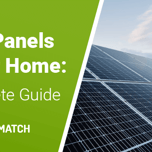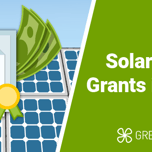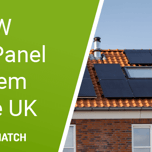Answer these simple questions and we will find you the BEST prices
Which type of solar quotes do you need?
It only takes 30 seconds
100% free with no obligation

Get up to 4 quotes by filling in only 1 quick form

Slash your energy bills by installing solar panels

For the average 2-3 bedroom house
- GreenMatch
- Solar Energy
- Photovoltaics
Photovoltaic (PV) Energy: How does it work? (April 2025)

Photovoltaics (PV) have transformed the way we produce and consume electricity. As photovoltaic systems utilise the sun's energy, they are a sustainable alternative to traditional fossil fuels. In this guide, we'll take you through everything you need to know about photovoltaics, from how they work to the different types.
If you're simply interested in getting solar PV panels for your home as soon as possible and don't want to read the entire article, then we can help you now.
Our team at GreenMatch can connect you with up to 3 qualified photovoltaics installers in your area. You'll receive a free quote from each installer so that you can compare their prices and ensure you're choosing the best solar panels.
Click the button below to get your free non-binding quotes now and have your PV solar installed in no time.
- Quotes from local engineers
- Payment by finance available
- Save up to £1,110 per year
It only takes 30 seconds



What Is Photovoltaics?
Photovoltaics is the direct conversion of light into electric power using semiconducting materials such as silicon. The photovoltaic effect is an important phenomenon studied in physics and chemistry.
The word photovoltaics (PV) was first mentioned around 1890, and it comes from the Greek words: photo, ‘phos,’ meaning light, and ‘volt,’ which refers to electricity.
Photovoltaic, therefore, means light-electricity, describing exactly the photovoltaic phenomenon where you can directly convert light into electricity.
Solar panels are using this phenomenon to supply green power for homes and industries, and fortunately, the cost of solar panels is on the decline, making the technology more available.
There is a hope that photovoltaic systems can make us independent of fossil fuels, addressing the current environmental problems.

How Does Photovoltaics Work?
Photovoltaic technology uses semiconductors to produce power based on the photoelectric effect.
If photons of light (either natural or artificial) with enough energy penetrate a photovoltaic cell, they can excite electrons to a higher energy state.
In fact, the electrons of a semiconductor that are not normally free, will become free and act just like they’re in a conducting material.
These free electrons can then be captured, resulting in an electric current that can be used to produce electricity. The more light gets absorbed, the more electricity will be produced by photovoltaics.
So by using the photovoltaic phenomenon, we can easily convert solar energy into electricity and use it as an alternative to traditional means of energy generation.
In the animation below, you can see how the process of photovoltaics can help power your household’s electricity needs.
Are Solar Panels and Photovoltaics the Same?
Solar panels and photovoltaic systems are synonymous. If several solar cells are electrically connected with each other within a supporting structure, a photovoltaic module is made.
You can connect solar cells in two different ways: series and parallel.
This way, PV modules can be made at different voltages for different applications.
The combination of multiple photovoltaic modules (or panels) is called a photovoltaic system. Solar panels produce direct current (DC) but with a solar inverter, you can convert it to alternate current (AC), which is used for home appliances.
What's the Difference between Solar Radiation and Thermal Energy?
One of the most important matters you need to know about solar energy is that it can benefit us in two different ways. It can:
- Generate electricity using the photovoltaic phenomenon
- Generate thermal energy using collectors and liquids (usually water)
In the first approach, solar PV panels on your roof absorb sunlight and convert it into usable electricity for your household.
In the second approach, sunlight energy will heat up a substance, which is usually water, that is housed in solar thermal panels. This is a solar water heating system that can meet your household’s water needs.
It is also good to know that researchers have recently done lots of studies to develop integrated thermo-photovoltaic cells to use the sunlight in both ways: heat and electricity.
What Are the Benefits of Solar PV Panels?
Now that you know what a PV panel is and how it works, it’s time to know the benefits of using this technology.
Here is a summary of the advantages of solar energy:
It’s Renewable and Abundant
The most important benefit of solar energy is that it is available every day, and we won’t run out of it. According to scientists, the sun will be shining for at least 5 billion years, providing us with solar energy.
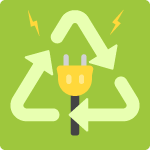
It’s Clean and Environmentally-Friendly
Unlike fossil fuels, solar energy has no harmful impact on the environment. So when you use solar energy, you’re contributing to saving the planet earth.
The Maintenance Costs Are Low
Fortunately, there are not many moving parts in solar energy systems, and subsequently, they don’t require a lot of maintenance cost.
Almost all reliable manufacturers offer a 20-25 years warranty for their panels. You only need to keep the surface of the panels relatively clean.
Using Solar Energy Reduces Your Electricity Bills
The more electricity you get from solar, the less you’re dependent on the grid, and as a result, the more your energy bills will drop. More on this topic can be found in our 'are solar panels worth it?' guide.
Of course, if you want to cover large chunks of your energy bills, you need to use large commercial solar panel systems.

You Can Earn Money with installing solar
The Smart Export Guarantee (SEG) scheme is part of the UK's plan of net-zero carbon emissions. It encourages UK homeowners to use renewable energy technologies by offering export tariffs in return.
Simply put, you can export renewable energy to the grid and get tariffs from energy companies. So you can use solar as a wise investment and earn a small income on the side.
Do you want to take advantage of the above benefits? Then we can help you get efficient solar PV panels installed in no time.
Simply click the button below and we'll send you up to 3 free non-binding quotes from qualified solar installers near you. Why wait? Start your journey towards saving money and a more environmentally-friendly home today.
- Quotes from local engineers
- Payment by finance available
- Save up to £1,110 per year
It only takes 30 seconds



What Types of PV Modules Are There?
The photovoltaic field is one of the fastest-growing technologies in the world, providing us with different options to use.
There are three different types of solar panels: monocrystalline, polycrystalline, and thin-film.
In addition, there are two system types: grid-connected and off-grid.
We cover the various differences below:
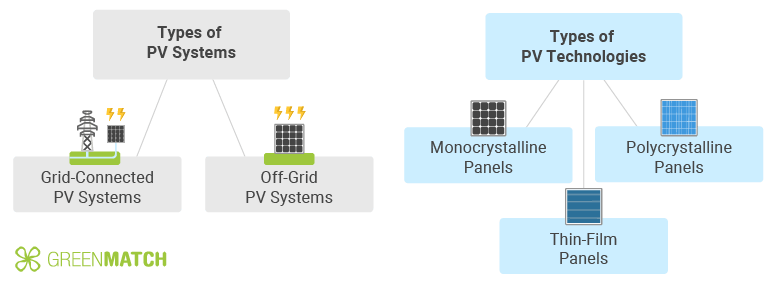
1. Monocrystalline Solar Panels
These PV cells are made of single-crystal silicon and are the purest form of photovoltaic cells. They usually have a uniform dark look, and their edges are rounded in solar panels.
Silicon's high purity allows more room for electrons to move. This makes them the most efficient type of solar panel, with rates of above 20%.
2. Polycrystalline Solar Panels
You can easily distinguish these cells because their angles are not cut in the PV panels. They are usually blue and manufactured by melting raw silicon, which is a faster and cheaper process than that used for monocrystalline cells.
However, they have a lower efficiency of around 15%.

3. Thin-Film Solar Panels
Thin-film solar cells are manufactured by placing one or more films of photovoltaic material onto a substrate such as glass, plastic, or metal. The photovoltaic material can be silicon, cadmium, or copper. Due to less material needed for production, thin-film solar cells are the easiest and the least expensive kinds of solar cells.
Grid-Connected vs Off-Grid Systems
Additionally, PV systems can be categorised in terms of being connected to the grid. In this regard, we have two main PV systems:
Off-Grid Systems
These are systems that are not connected to the grid. They are generally used to cover the electricity needs of remote buildings or vacation homes which have no access to the public grid.
These panels are a convenient option since they do not require special permits from electricity distribution companies.
However, since they are 100% independent, off-grid systems generally require an additional generator or solar batteries to have electricity when the sun is not shining.
Grid-Connected Systems
These systems are connected to the grid, which means you can use electricity from the power company when you need it.
When you don’t, you can use the electricity generated by your panels for your personal use, and you can also choose to sell all, or the excess, back to the grid.
What About Lifespan of a Photovoltaic Module?
One of the very positive aspects of investing in photovoltaics is that the product has a long lifespan. The exact number depends on different variables such as the quality of the panel and climatic conditions, but generally, PV modules will last more than 40 years.
Moreover, PV systems require very little maintenance, and they usually come with a 25-year performance warranty.
However, solar PV inverters, which are the ones in charge of converting solar DC to grid AC electricity, might need to be replaced after 12 to 15 years and usually come with a 5-year guarantee.
With an average lifespan of 25 years, solar cell waste in the world can reach up to 78 million tons by 2050. That’s why developing technologies for recycling solar panels has now drawn the attention of experts and policymakers in developed countries.
The Future of Photovoltaics
It’s also good to know the prospect of photovoltaic technologies to choose a wise approach to use PV panels or even invest in them.
First, you need to know about solar panel grants as governmental incentives regarding renewable technologies, especially photovoltaics. In the UK, there are a few types of grants available to you if you want to invest in solar energy:
- Smart Export Guarantee (SEG)
- Reduced VAT on Energy-Saving Products
- Feed-in Tariff (FIT) (no longer open to new applications)
- Renewable Heat Incentive (RHI) (no longer open to new applications)
So you can choose a suitable program for using photovoltaics according to your conditions.
Another important matter in this regard is space-based solar power (SBSP). It is an advanced, forward-thinking technology aiming to collect the sun's energy in space and then wirelessly transmit it to our planet.
Some countries like China, USA, and Japan are heavily investing in this idea as the future of Photovoltaics.
Ready to use photovoltaics to power your home? GreenMatch can help connect you with up to 3 relevant solar PV installers in your area. All you need to do is fill in the form and we’ll get your enquiry processed right away! This service is entirely free and non-binding.
- Quotes from local engineers
- Payment by finance available
- Save up to £1,110 per year
It only takes 30 seconds



FAQ about Photovoltaics
Photovoltaic systems, also known as solar panels are made of semiconducting materials like silicon that can directly convert sunlight into electricity.
The electricity produced by PV panels is renewable and green because its source is solar energy. Fortunately, solar energy is abundant and inexhaustible. By harnessing photovoltaic energy for your household needs, you can reduce your home’s carbon footprint.
Using renewable sources of energy, being environmentally-friendly, reducing electricity bills, and becoming grid-independent are some advantages of solar energy.
Yes, it is possible to go off-grid with a photovoltaic system. There are two different kinds of solar PV systems: off-grid systems and grid-connected systems.

Hossein Karami Lakeh is an engineer interested in different aspects of energy, especially renewable energy technologies. He holds a master’s degree in mechanical engineering, focusing on thermo-photovoltaic systems. He has written several articles for valid ISI journals, international conferences, and high-authority websites to share his ideas on how to make the world a better place to live.
We strive to connect our customers with the right product and supplier. Would you like to be part of GreenMatch?


